I made this chilled tofu and tomato salad (a.k.a. vegan caprese) with homemade tofu. I had fresh soy milk from Nijiya market (a California-based Japanese grocery store chain) that was lingering in our fridge. It’s rich, sweet tasting milk. It’s a delicious product that happens to be made from organic soybeans. There is no indication that the beans were non-GMO.
When I buy soy products like tofu and soy milk, I note whether or not the beans are organic and or non-GMO. I don’t have to check off both boxes, however. Sometimes, I let it go. For example, my favorite soy sauces don’t qualify their soybeans as anything but soybeans. I judge food ingredients based on whether or not they are good tasting, consistent, and made with integrity. I read the label, check the website, judge by flavor and function in my kitchen.
It’s hard with products from Asia. For example, Pearl River Bridge has in the past indicated that they made soy sauce from non-GMO beans. The type was so small on their Golden Label Light Soy Sauce label I had to get a magnifying glass out to see it.
Kikkoman has an organic soy sauce but I had to look on their website to see if the beans were non-GMO. Note it says “GMO-free” and such wording may reflect cultural and communication differences. Kikkoman makes soy sauces for many markets, and something like this soy sauce isn’t going to be sold at the corner grocery, but rather Japanese and Chinese markets.
Most people are concerned about tofu. I received this email from Selma in Texas:
I am glad I found you online as I do have a big concern regarding what I buy a lot. I am vegetarian/vegan, using a lot of tofu in my cooking considering that I am also from an Asian country. Someone had told me that there is no such thing here anymore in the US as organic, non-GMO soybeans. I know we grow a lot of GMO soybeans here in America. In your line of expertise, are you aware of this or is this true at all or not? I called Nasoya Company and requested to talk to their Supervisor or Nutritionist if they employ one in that capacity, a lady answered and she told me she can help me with my questions. I asked where their supply of soybeans is coming from and how do we know they use organic soybeans for their tofu. There was few minutes of silence then hung up or disconnected. I tried to call back few times but the message says it is temporarily unavailable. We are really concerned about what we eat from day to day basis. I would appreciate very much if you can shed some light on this. I may just be misinformed. I want to know the truth about this. Or perhaps you may help me where to purchase my organic. non-GMO tofu. I thank you very much.
That was rude of Nasoya’s customer service! In answering Selma, I related how most tofu makers are getting soybeans from a bunch of different growers so they can’t pinpoint the exact source. Traceability with soybeans is much harder than with say, seafood, which has its own struggles with sourcing issues.
The other thing with soybeans is there are thousands of breeds of soybeans. Many have been naturally bred while some have been genetically modified for different uses. Certain kinds of soybeans are cultivated for animal feed, oil, and even seat belts! Some soybean varieties are bred and farmed for direct human use in soy milk, tofu, and tempeh. Soybeans also do not look the same. A tiny glimpse of their diversity:
Years ago, I learned that AFC tofu in Los Angeles was using non-GMO beans but because they’d invested so much in packaging that they didn’t want to redo their labeling to include non-GMO in the text! I like their pressed and baked tofu a lot -- it’s sold at Chinese markets.
To help Selma out, I pointed her to Wildwood tofu, sold at health food markets like Whole Foods and I suspect they private label Trader Joe’s extra and super-firm tofu.
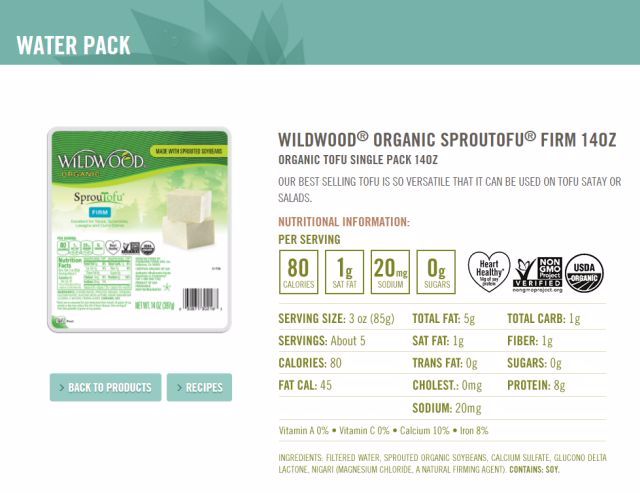
She wrote back that she grocery shops at Walmart. It’s pretty cool that Walmart sells tofu! I’m happy to know that what was deemed vile by many Americans is now mainstream.
Curious about how easy or not easy it is to find organic, non-GMO tofu and soy products, I went to my local supermarkets and looked in my pantry. Here’s what I found:
The Whole Foods tofu in my fridge is organic but not marked as non-GMO. I really like it, as well as the tofu sold at Trader Joe’s, which is also organic. I’ve been buying tofu from both retailers for years and it’s excellent, with a fast turnover to indicate that it doesn’t sit around. I’m sticking with those brands.
Nasoya tofu at our local Safeway is marked as organic and non-GMO. I didn’t pay attention before. It’s a good brand that’s nationally distributed. However, I’m not a huge fan of glucono delta lactone (GDL), a coagulant that makes tofu firm and jello-like. Wildwood often uses it too. (More on tofu coagulants here.) Tofu with GDL doesn’t absorb flavors well because it's not very porous but it sure holds its shape. So the question is whether or not organic and non-GMO outweigh the texture and flavor of a dish? That’s a personal choice that I’ll leave to you to decide.
Hodo Soy’s tofu, made in Berkeley, is firmer than I like. However, I know from talking to their founder Minh Tsai that they contract with specific farmers to raise soybeans for their use. That’s rare traceability in the soy food industry.
When I make soy milk and tofu from scratch, I buy soybeans from one grower in Iowa. The beans are superb, rich, and flavorful. The beans are non-GMO but not organic. The organic soybeans I’ve tried from local and Asian markets have been so-so. I’m sticking with mail ordering Laura soybeans.
Westsoy, which has been in operation for decades, makes my favorite aseptic (boxed) soy milk and tempeh from organic, non-GMO soybeans. They’re great tasting products. Westsoy used to make an extra rich soymilk that clocked in at around 11 grams of protein per cup. I don’t see it on their site but hope it’s still around. I’ve bought it at Whole Foods.
The original tempeh comes close to what I’ve had in Asia. Westsoy tofu is not sold near me so I’ve not tried it, but it’s likely made from the same organic and non-GMO soybeans.
Looking around in my pantry, I found San-J tamari. It’s made from organic and non-GMO soybeans. It’s not my favorite gluten-free soy sauce because there’s a tart after taste. Use a little sugar in dishes to counter that note.
Then I checked with Pearl River Bridge’s website for an organic soy sauce. Surprisingly, I found a PRB soy sauce featuring non-GMO soybeans but it’s sold in Australia. There seems to be an American organic version but the beans are not specified as non-GMO. That said, I’m going to look for it at the Chinese market!
I think this proves that organic, non-GMO soy foods and ingredients are available in the United States. You may have to hunt for them. On the other hand, they may be right under your nose in the form of a favorite product!
Selma asked a great question and I hope she and others feel more empowered as a vegetarians and eaters of good healthy food.
Have tips or insights to add? Don't hold back! Thanks.
So how about some tofu recipes?













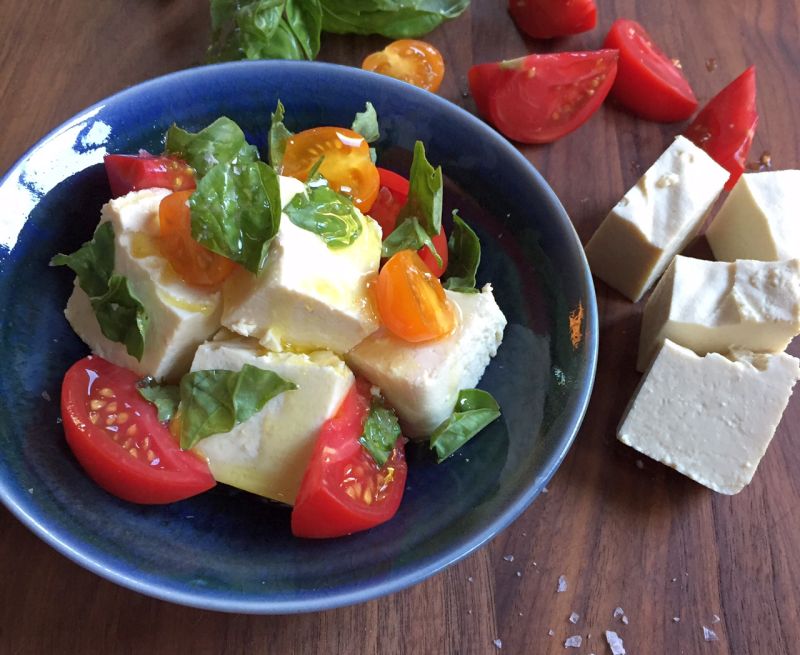
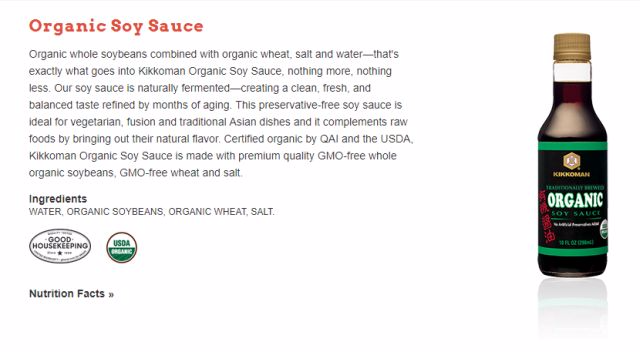
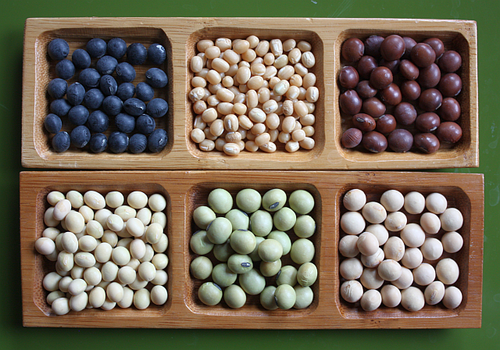
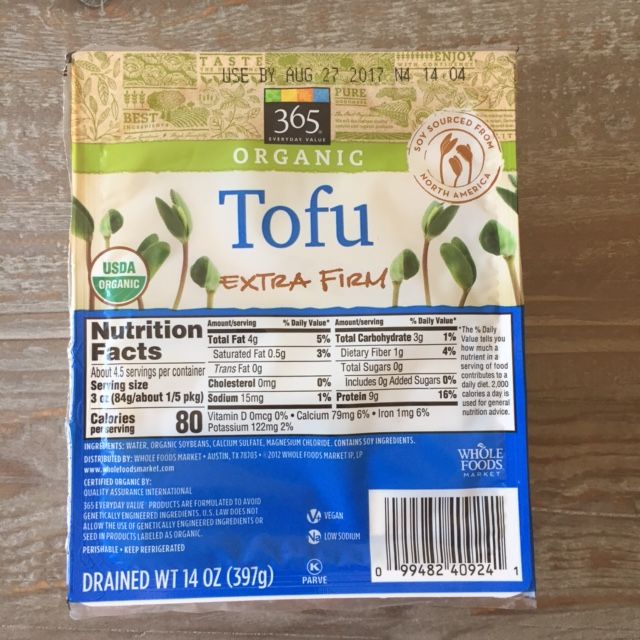
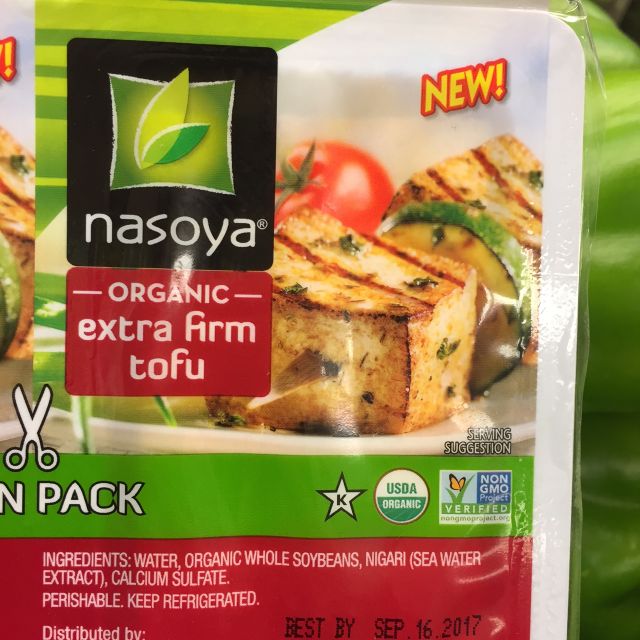
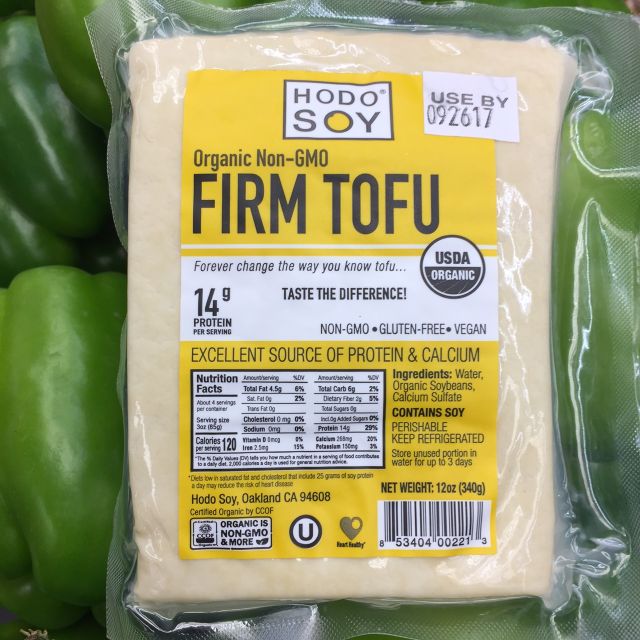
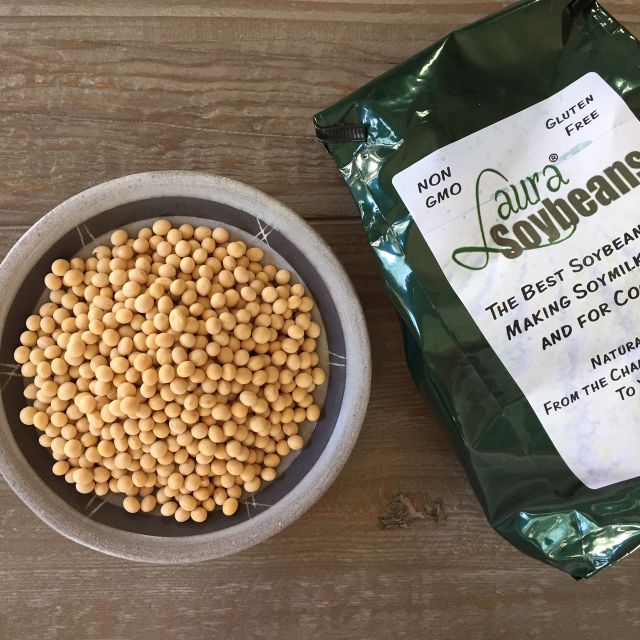
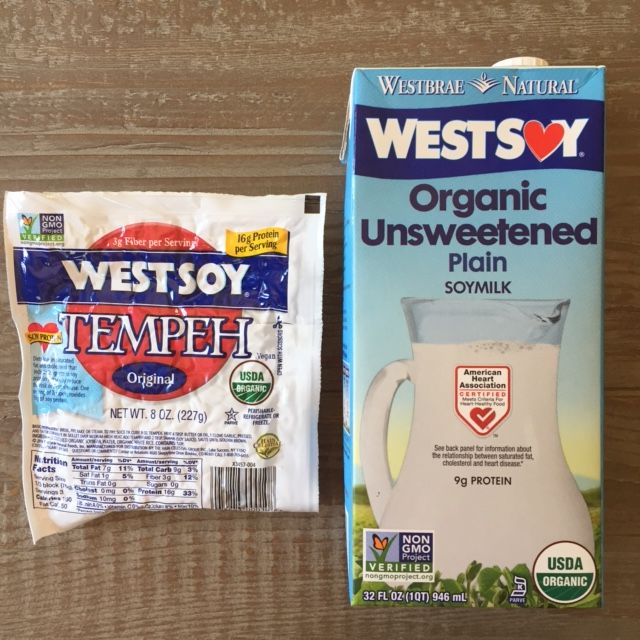
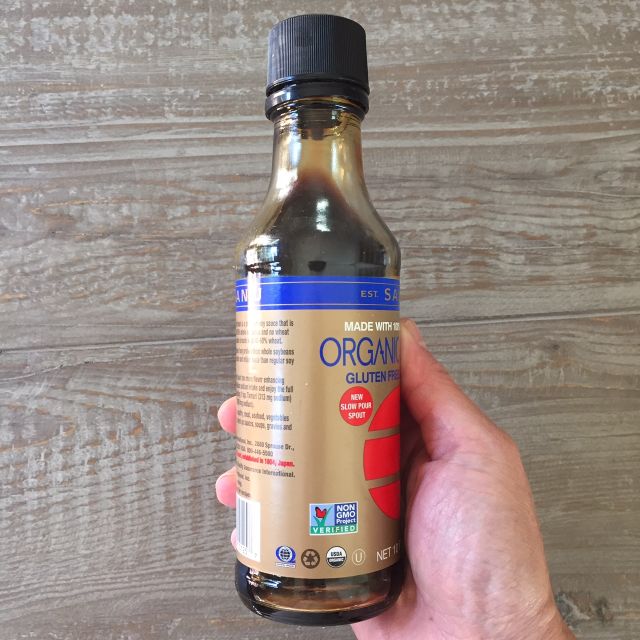


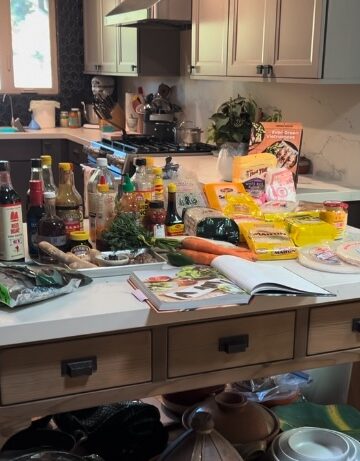
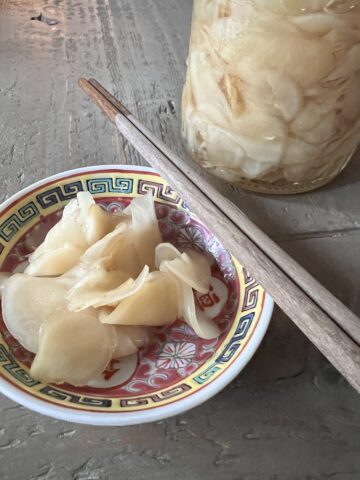
Kevin P says
Andrea,
I have a question about Vietnamese Soy Sauce. I recently picked up a bottle of "La Bo De" (my apologies - I can't replicate the diacritical characters). The sauce was so SALTY. I'd like to understand how this sauce is used.
Is it used in particular dishes? Is it used full-strength or is it diluted?
Thanks so much!
-Kevin
Hugh says
According to the USDA website, GMO soy can't be labeled as certified organic. If you're trying to avoid GMOs, buying organic soy is probably a good bet, with the caveat that that info from USDA is from 2013 (I don't think that's changed with the change of administration).
Emily says
If something is 100% USDA Certified Organic, it is automatically non-gmo! However, not all non-gmo products are automatically organic. It's a square to rectangle kind of thing.
An interesting link on the subject: https://gmo-awareness.com/2011/05/05/is-organic-always-gmo-free/
Andrea Nguyen says
That's interesting. But I notice that Westsoy has USDA organic certification and non-GMO certification.
Andrea Nguyen says
Go for the organic and then look for a different non-GMO certification, if both of those qualifiers are important. That seems sound to me!
Andrea Nguyen says
You'd want to mix it with other ingredients -- water and sugar. Is it like a super salty version of fermented soy beans? I'm not familiar with the soy sauce made by La Bo De. I've only bought the fermented soy beans in the tall jar.
Luna says
I never knew that! thank you for the interesting info!
Kevin P says
Andrea,
Thanks for the response. This is the SALTIEST soy sauce I've ever tasted. My friend Chau mentioned that no one really buys it except for the strictly religious.
I'd be happy to send a bottle your way if you're interested!
Regards,
-K
Andrea Nguyen says
Do they have a sodium count on the back? Usually regular, full-sodium soy sauce is about 920 mg of sodium per tablespoon. You can compare the sodium count and dilute the La bo De to come to about 900 mg.
Thanks for offering to send me a bottle. I trust your judgment on this one!
Marc says
So where is the part that answers the question of whether it matters of not? Is that because the science clearly says there is no nutritional difference between organic, non-smoking and GMO foods side both are merely growing/being methods and not ingredients? And that is taking into account the high likelihood the organic pesticide and herbicide residue is more toxic than what can be used when the organism is genetically resistant to posts?
Bottom line: both the organic and anti -GMO labels are little more than clever marketing and an excuse for you to pay more for the same nutrition. And they promote more wasteful and harmful agricultural methods. Having witnessed symposia with both researchers and the Organic lobby, it is very clear which side has the facts and such is the con job.
Andrea Nguyen says
Thanks for weighing in, Marc! With retailers like Walmart and Costco having gotten on board with selling more organic foods products, the prices have come down. Food producers choose the best ingredients to meet their business needs. Consumers need to consider their budgets, culinary uses, and tastes. It's up to individuals to identify the intersections that suit them and make the economic choices.
Yes, the jury is out on organic and non-GMO, but for people for whom that kind of labeling matters, they have affordable options. As consumers and cooks, it's important to be curious. I encourage people to keep an open mind.
Iquo says
Thank you so much for this post! I've just watched a 2008 documentary Food, Inc., which has opened my eyes to all the GMO soybeans being grown in the US. I will look into all of these products although I typically buy most of my soy from Trader Joe's. I have a big question about Silk soy milk products: where are they getting their soybeans? My office has free soy milk that I use daily at the coffee bar and I just want to be sure about drinking Silk or not. Personally, I don't buy it because I generally don't like the taste.
Andrea Nguyen says
I have no idea about where Silk gets its soybeans. Totally agree with you that its taste is funny. There is usually flavorings or sugar in it so mask the taste of soybeans. When soy milk is made from good beans, there's nothing to hide. 😉
KimcheeMomma says
Most items from Trader Joe’s is not organic. Most of my friends had that misconception. I’m not sure about non gmo. However when I’ve been I don’t see the non gmo label on a lot of their products. That doesn’t necessarily mean it’s not non gmo since you have to pay extra for that certification.
Andrea Nguyen says
Always read the label carefully, if you look for that kind of information!
Vianney says
I’m really new at this, if it’s organic or non gmo is it fermented?
Andrea Nguyen says
When you're talking about an ingredient like soy sauce, miso or tempeh, fermentation is involved. Most kinds of tofu is not fermented. There's is fermented tofu that's cheeselike and absolutely delicious for adding umami to food.
Susan says
Coming late to this, but I have to comment that when dealing with certain health problems, GMO
does matter. It seems that my friend who has Hashimoto's disease cannot tolerate the different kinds of proteins in GMO foods. My husband was just diagnosed with a brain tumor, and he was advised by a science-based normal medical facility that the latest science is beginning to show that he should also avoid GMO products. I think more and more, they will realize that while "nutritionally" it might be equal for healthy people, that for those with certain conditions, it really does matter. And I'm thinking if it matters for them, do I really want to consume it? Just seems smart (and much easier than in the past) to avoid pesticides as well as GMO foods.
Andrea Nguyen says
Thanks for sharing your experiences, Susan. As you say, each person needs to weigh their own situation and make their own informed decision.